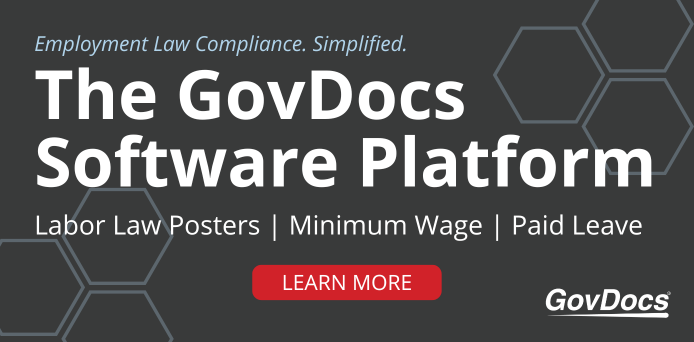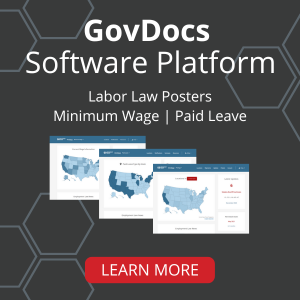EMPLOYMENT LAW NEWS
Labor Law Posters for Predictive Scheduling Laws
By Kris Janisch
Published Aug. 16, 2023

Labor law posters for predictive scheduling laws are only the first piece of the compliance puzzle regarding these types of laws.
With the rise of predictive scheduling laws in recent years, large employers may be wondering about the associated labor law posters.
Also, at a high level, predictive scheduling laws can be called other things, like “fair workweek” or sometimes, colloquially, “predictive pay” laws. And there are other related laws, including payday notices, that also require employers to display the applicable labor law poster.
While this post will focus on the labor law poster requirements for employers regarding predictive scheduling, details on many of these laws can be found in a previous Employment Law News post: Predictive Scheduling Laws: What Employers Need to Know.
Get More Out of Your Labor Law Poster Program
Posters for Predictive Scheduling Laws
Below are the active labor law posters related to predictive scheduling as of July 2023. As always, employers should check with legal counsel to ensure compliance with these and other employment laws that may apply to the jurisdictions where they have locations.
Oregon Predictive Scheduling
Required for employers that are retail, hospitality or food service establishments employing 500 or more workers worldwide.
Philadelphia Fair Workweek
Required for retail, hospitality and food establishment employers with 250 or more workers worldwide and 30 or more locations worldwide.
There is also a Spanish version of this predictive scheduling poster, which must be displayed by employers that meet the criteria above and have more than 5 percent Spanish-speaking employees.
Emeryville (Calif.) Fair Workweek Ordinance
Required for retail firms with 56 or more employees globally and fast food firms with 56 or more employees globally and 20 or more employees in Emeryville.
There is also a required Spanish version of the Emeryville fair workweek poster and an optional version in Chinese.
Los Angeles Fair Work Week
Required for retail employers who have 300 or more employees globally.
However, there are several other versions of the poster in languages other than English. They must be displayed by employers that meet the criteria above and have 5 percent or more employees who speak:
- Armenian
- Chinese – Cantonese
- Chinese – Mandarin
- English
- Farsi
- Hindi
- Japanese
- Korean
- Russian
- Spanish
- Tagalog
- Thai
- Vietnamese
Learn more about the Los Angeles Fair Work Week ordinance.
Chicago Fair Workweek
Required for employers primarily engaged in a covered industry under the ordinance (building services, healthcare, hotel, manufacturing, restaurant, retail or warehouse services) that also employ 100 or more employees (250 for nonprofits), at least 50 of whom are covered by the ordinance.
There are also optional labor law posters for the Chicago fair workweek ordinance in Polish and Spanish.
New York City
New York City has two fair workweek ordinances. The poster requirements are:
- New York City Fast Food Fair Workweek – required for all fast food employers (a Spanish version is required for employers meeting the 5 percent or more threshold)
- New York City Retail Fair Workweek – required for all retail employers (a Spanish version is required for employers meeting the 5 percent or more threshold)
San Francisco Formula Retail Employee Rights
Required for employers with at least 40 retail sales establishments worldwide and 20 or more employees in San Francisco.
There are also required versions in other languages.
Berkeley (Calif.) Family Friendly and Environment Friendly Workplace
Required for businesses in Berkeley that employ 10 or more employees. It must be posted in English, Spanish and Chinese.
There are also posting requirements for employers that meet the at least 5 percent threshold in any language.
Seattle Secure Scheduling
Required for hourly employees at retail and food service establishments with 500 or more employees worldwide, as well as full-service restaurants that have 40 or more locations worldwide.
There are also versions in several other languages.
Other Predictive Scheduling Posters?
These are the bulk of the labor law poster requirements for what are typically referred to as predictive scheduling laws.
However, employers should note that there are other types of laws that may be similar, including the:
- San Jose Opportunity to Work ordinance
- Illinois One Day Rest in Seven law
- New Hampshire law barring retaliation against employees who request a flexible work schedule
As always, employment laws can be passed at any time, and employers should monitor the jurisdictions where they have locations to ensure labor law poster compliance.
Labor Law Poster Compliance Kit
Labor Law Poster Compliance
As some regular readers of Employment Law News may have guessed, this post was generated after a client, one of the nation’s largest clothing retailers, asked our Employment Law and Compliance Department about labor law posters for predictive scheduling laws.
Clearly, the challenges of poster compliance continue to expand, especially for large organizations operating in jurisdictions across the U.S.
Some previous questions from GovDocs clients that became blogs of late include:
- Texas Workplace Violence Poster
- Labor Law Posters: Multiple Companies in the Same Building?
- New York State Veterans’ Benefits Labor Law Poster
- States with Human Trafficking Posters
- Required Spanish Labor Law Postings
- New Denver Wage Theft Law
- Illinois One Day Rest in Seven: Labor Law Poster Update
- Los Angeles Predictive Scheduling Ordinance
Labor Law Poster Compliance Resources
Conclusion
Labor law posters for predictive scheduling laws are only the first piece of the compliance puzzle regarding these types of statues.
Each carries different obligations for employers. And they can differ based on:
- Recordkeeping requirements
- Notifying employees of potential on-call shifts
- Allowing existing employees the opportunity to take on hours before an employer hires a new worker
- Penalties for last-minute schedule changes
- Telling new hires how many hours they can expect to work
Employers with locations in the jurisdictions listed above should double check to ensure they’re following the applicable laws, including labor law posters and the nuances of predictive scheduling.
This Employment Law News blog is intended for market awareness only, it is not to be used for legal advice or counsel.
Keep Informed
with GovDocs Employment Law News
Who is GovDocs?
GovDocs simplifies employment law compliance for large employers in the U.S. and Canada. The GovDocs software platform integrates three solutions in one convenient place to help you master the employment laws impacting your business. Whether you manage a labor law posters, minimum wage or paid leave program, our products cut through research time, provide proactive insights into the everchanging landscape of employment laws and reduce the risk of noncompliance. The company is headquartered in Eagan, Minn.
The GovDocs Poster Store simplifies posting compliance for employers with less than 30 locations across all industries, offering a variety of posting products to meet your labor law compliance needs.





